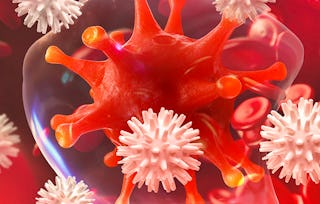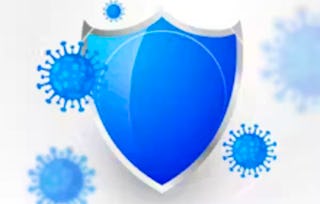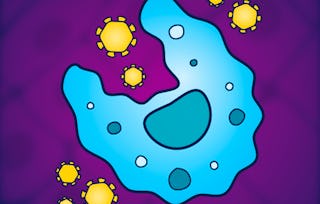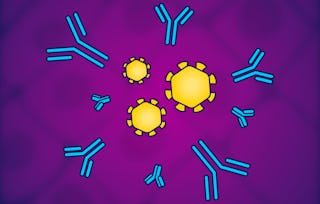In this course, you will explore the mechanisms and immune responses involved in autoimmune diseases and in hyper-responsive phenomena, such as asthma. You will examine in detail the potential causes and factors behind an overactive immune system and the disorders that might ensue if the response is not adequately controlled. you will also analyse the effects of overactive immune response in transplant rejection.

Immunology: Autoimmunity, Allergy, and Transplants

Immunology: Autoimmunity, Allergy, and Transplants
This course is part of Immunology: The Immune System and its Failures Specialization


Instructors: Malgorzata (Maggie) Trela
4,579 already enrolled
Included with
(60 reviews)
Recommended experience
What you'll learn
In this course, you will learn about the consequences of the imbalance between the effector and regulatory immune responses.
You will also take a closer look at the potential mechanisms behind autoimmunity in the context of common autoimmune conditions.
You will examine the exaggerated/unnecessary immune reactions to innocuous particles, observed in allergies and hypersensitivity reactions in asthma.
Skills you'll gain
Details to know

Add to your LinkedIn profile
10 assignments
See how employees at top companies are mastering in-demand skills

Build your subject-matter expertise
- Learn new concepts from industry experts
- Gain a foundational understanding of a subject or tool
- Develop job-relevant skills with hands-on projects
- Earn a shareable career certificate

There are 5 modules in this course
Autoimmunity, characterised by self-aggression by the immune system, is a series of highly complex and multifactorial conditions which result from uncontrolled immune responses. In module one, you will explore the mechanisms involved in autoimmunity, investigate autoimmune disease types and discuss novel treatments.
What's included
4 videos3 readings2 assignments
In the company of our world-wide expert, module two will present a common autoimmune condition, systemic lupus erythematosus in more details. Together, you will explore the causes and risks factors at the origin of the condition, you will focus on the immune origins of the diseases and touch on the impact of environmental factors.
What's included
1 video2 readings2 assignments
In module three, you will explore two autoimmune conditions affecting specific blood components. Using these two conditions, our expert will illustrate their causative immune dysregulation, their pathogenesis, and current treatment strategies. Finally, the course will illustrate additional autoimmune blood condition and detail their immunological cause.
What's included
1 video2 readings2 assignments
Asthma and allergic diseases constitute the most common chronic inflammatory disorders, particularly in children, with constantly increasing prevalence in Westernised countries. Module four will explore these complex conditions. The interactions between genetic and environmental factors as well as the involvement of immune players, notably the cells subsets that are involved, and the research that is being conducted to develop novel treatment strategies.
What's included
3 videos2 readings2 assignments1 discussion prompt
Module 5, last one in this course, will focus on transplantation and the role of the immune system in this life-saving intervention. By exploring the involvement of both innate and adaptive immune cells and molecules, your will ultimately better understand the therapeutic measures taken to ultimately prevent graft rejection.
What's included
2 videos5 readings2 assignments
Earn a career certificate
Add this credential to your LinkedIn profile, resume, or CV. Share it on social media and in your performance review.
Instructors


Offered by
Explore more from Basic Science
 Status: Free Trial
Status: Free Trial Status: Preview
Status: PreviewJordan University of Science and Technology
 Status: Free Trial
Status: Free TrialImperial College London
 Status: Free Trial
Status: Free TrialImperial College London
Why people choose Coursera for their career

Felipe M.

Jennifer J.

Larry W.

Chaitanya A.
Learner reviews
- 5 stars
83.33%
- 4 stars
13.33%
- 3 stars
3.33%
- 2 stars
0%
- 1 star
0%
Showing 3 of 60
Reviewed on Oct 12, 2025
As an A levels student, I found this course to be very thought provoking and insightful.
Reviewed on Sep 21, 2025
Excellent, thoughtful course. I've enjoyed it very much.

Open new doors with Coursera Plus
Unlimited access to 10,000+ world-class courses, hands-on projects, and job-ready certificate programs - all included in your subscription
Advance your career with an online degree
Earn a degree from world-class universities - 100% online
Join over 3,400 global companies that choose Coursera for Business
Upskill your employees to excel in the digital economy
Frequently asked questions
To access the course materials, assignments and to earn a Certificate, you will need to purchase the Certificate experience when you enroll in a course. You can try a Free Trial instead, or apply for Financial Aid. The course may offer 'Full Course, No Certificate' instead. This option lets you see all course materials, submit required assessments, and get a final grade. This also means that you will not be able to purchase a Certificate experience.
When you enroll in the course, you get access to all of the courses in the Specialization, and you earn a certificate when you complete the work. Your electronic Certificate will be added to your Accomplishments page - from there, you can print your Certificate or add it to your LinkedIn profile.
Yes. In select learning programs, you can apply for financial aid or a scholarship if you can’t afford the enrollment fee. If fin aid or scholarship is available for your learning program selection, you’ll find a link to apply on the description page.
More questions
Financial aid available,

